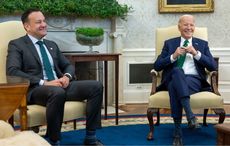The UK General election is shaping up as one of the most fascinating for generations and one that will utterly transform the British political landscape. Amazingly, the opinion poll figures for most of the parties have barely changed in the three weeks since the contest began. The two main parties are still almost neck and neck at about 34% and unable to create any further headway – or achieve a working majority in the 650 member parliament.
It is all about the balance of power and in a very likely ‘hung parliament’ where just a few seats are crucial. If Labour and the Scottish Nationalist Party needed a few more to form a coalition, would Sinn Fein not be remiss in not signing up, especially given that such a government would be a left-leaning one and given that they are already working in a UK Government in the North and accept the Good Friday Agreement? It is a debate that some are having at the margins of the party.
Sinn Fein has an abstentionist policy at present, but if the price is keeping the unionist party, the DUP out of power with the Tories, would they discard it?
An absent Sinn Fein will look at the possible influence that Ulster’s Democratic Unionist Party (DUP) would secure if it agrees to shore up a prospective Conservative government. The DUP could gain measures that would boost their Unionist cause and undo much of what Sinn Fein has gained at Stormont. This could create new instability in the always fragile peace settlement in Northern Ireland.
Basically, the two party system which has dominated Britain since the World War One, with either the left-leaning Labour party or the right-leaning Conservative party taking power on its own, is absolutely gone and we are now facing the prospect of any number of different alignments, coalitions or ‘arrangements.’
As it was, the last election, in 2010, produced a coalition between the dominant Conservatives, led by David Cameron, and the smaller Liberal Democrats, which was seen as a novel breakthrough for UK politics. However, this ‘new departure’ now seems tame compared to the current possibilities up for a future governing coalition (or more informal ‘arrangement’) as the political system fragments into smaller, and often more nationalistic parties, just as is happening in the rest of Europe.
More dramatically, the election will almost certainly lead to renewal of the push for Scottish independence and the possible break-up of the UK. This is because of the rise of the Scottish National Party (SNP), led by its charismatic new leader Nicola Sturgeon, which has surged in strength to be the third biggest party. The SNP is destined to take up to 50 seats and will obliterate the Labour party in Scotland.
Meanwhile, on the right, the arrival of the UK Independence party (UKIP) has strengthened the always vibrant anti-European sentiment in the UK and heightened the prospect a British exit from the European Union in the proposed referendum on UK membership of the EU in 2017– or at the very least a dramatic re-negotiation of the UK-EU relationship. This will have major implications for Europe.
Indeed, both of these possibilities – Scottish independence and a UK exit from the EU – would have major implications for Ireland, especially the latter move. Only this week, the British think-tank Open Europe estimated that such an exit could cost the Irish economy up to €4 billion in lost exports, not to mention also denying Ireland a like-minded, free trade partner at the EU table.
Such a EU-UK realignment would be the price that UKIP, led by the blokey Nigel Farage, would demand for supporting the Conservatives in Government while more powers and possible independence for Scotland would be the price for the SNP supporting Labour.
However, these two possible partnerships may not be enough to form a Government. This is especially the case on the Conservative side where Northern Ireland’s Democratic Unionist Party (DUP) would also be called on to join a coalition and have already been in low-level talks about this.
On the Labour side, there would probably be enough seats between them and the SNP, but if they were short a few more seats, would Sinn Fein be prepared to abandon its long-held abstention policy in Westminster and support such a Government?
This is only one of the ironies in what has been the most unpredictable and fascinating of elections. The other irony is that the SNP would be propping up a Labour Government, many of whose economic policies it shares – even though its electoral success has been completely at Labour’s expense. The other irony is that the SNP is boosting its cause, but actually joining a UK Government! This will be a tempting example for the likes of Sinn Fein which has had the very opposite policy, of abstaining from Westminster.
Both of the two possible UK governments would be ‘nose peg’ arrangements: awkward partnerships between political parties which dislike each other and are rivals, out to take each other’s vote. UKIP mainly represents voters who feel the Conservative Party has not been Conservative enough, especially about stemming immigration. The Scottish Nationalists meanwhile have run Labour out of Scotland (There is only one Tory seat in Scotland!)
The momentum of the election campaign has also been interesting. Although the Tories and Labour are neck and neck, the reality is that the former should be well ahead, given the recovery in the UK economy and the highest number of people in employment in the UK since 2008.
But the Labour leader, Ed Miliband, hitherto regarded as the nerdy less-talented sibling of his brother David (who is now based in New York), has actually shown himself steely during the election and has successfully reached out to voters who feel that the well-heeled Tories are out of touch with ordinary voters affected by austerity. This is quite an achievement for Miliband and for Labour which is still associated with running up a budget deficit when last in government and with bringing the UK into unpopular Middle East wars. The campaign has not been so positive for Cameron who has lost some of his mojo and has been accused of being ‘too posh to push’! Meanwhile, his partners in government, the Liberal Democrats, have been made irrelevant.
The arrival of smaller and newer parties, challenging the existing two-party system has also seen the arrival of new female politicians challenging the existing and often aggressive male style of politics. The TV debates have been opened up to the full range of parties and the sight of female leaders like Nicola Sturgeon, as well as Leanne Wood of the Welsh nationalists Plaid Cymru and Natalie Bennett of the Greens, arguing cogently, passionately but without the belligerence of their male colleagues, has been a revelation to the electorate, who have rewarded them with high numbers in the polls.
At the end of one energetic and often divisive TV debate, the three women even had a group hug, much to the surprise of Labour leader Ed Miliband who was standing by! David Cameron was not in this particular debate, but it didn’t matter – no other image could bring home just how much this election has actually changed British politics, possibly for ever.




Comments